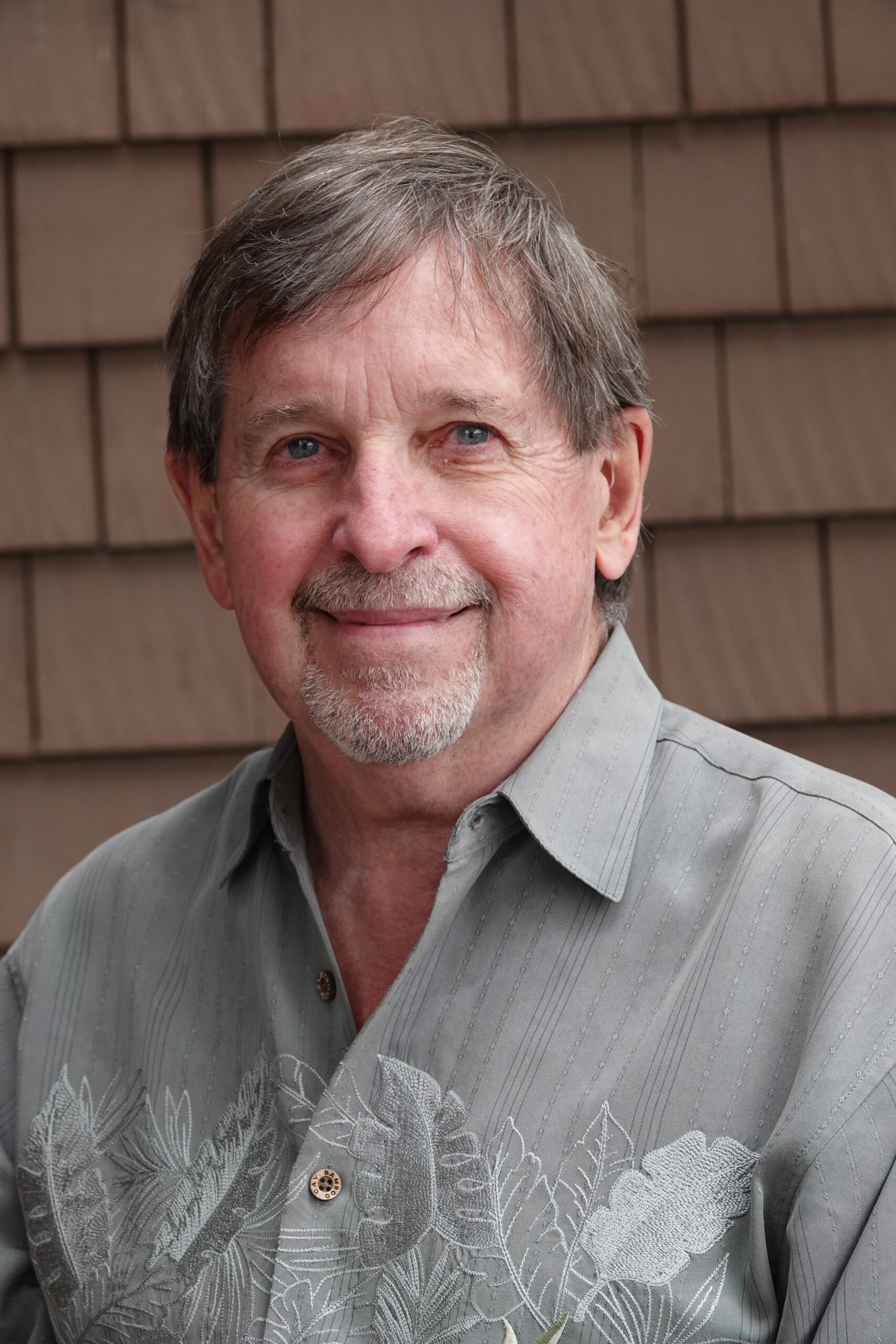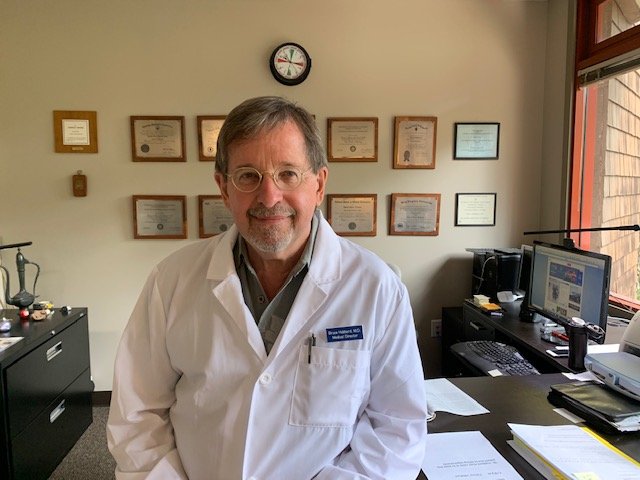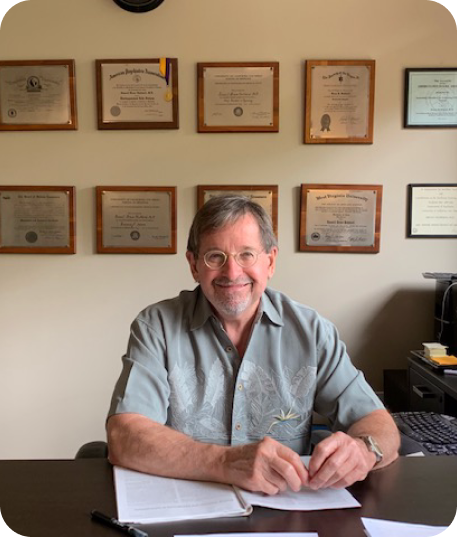Dr. Hubbard has been practicing psychiatry in San Diego since 1981. He is considered by his peers to be an expert diagnostician and has treated thousands of patients with psychopharmacology.
He is a leader in the practice of TMS, having treated over 850 patients. Dr. Hubbard recognized the power of combining such effective tools as medicine, psychotherapy and TMS to bring about lasting relief for his patients while minimizing side effects.

Dr. Hubbard is a native of Wheeling, West Virginia. He achieved a B.A. cum laude in psychology from West Virginia University in Morgantown, West Virginia.
Dr. Hubbard began his professional training at Vanderbilt University School of Medicine in Nashville, Tennessee, graduating with his doctorate in medicine in 1972. He then continued his training at the University of California School of Medicine, Department of Psychiatry, where he completed his internship and residency training in psychiatry in 1975 and was chief resident in psychiatry.
Following his residency training, Dr. Hubbard held a full-time faculty position in the Psychiatry Department at University of California at San Diego (UCSD), where he specialized in teaching, research and managing an inpatient unit at the La Jolla Veterans Administration Hospital.
Dr. Hubbard continues to supervise medical resident students at UCSD school of medicine.
In 1979 Dr. Hubbard entered private practice of psychiatry full time in San Diego and has been in practice continuously since that time.
“Depression runs in families and it ran in mine so I know firsthand how it feels and what it does to the soul. I also know how to break free of it. My lifelong goal has been to understand and treat depression because so many people suffer needlessly. Of all of the many treatments for depression – Cognitive Behavioral Therapy, medication, identifying personal triggers, etc. – I have seen none as powerful as TMS. And when combined with treatments above, the results are even more powerful.

California Medical Board
(1992-1995)
Review of psychiatrists subject to disciplinary action.
University of California, San Diego
(1979-Current)
Teaching first-year residents in psychiatry in diagnosis and treatment of outpatients
Department of Justice
(1985-1995)
San Diego Zoo
(1984-1995)
Research involving primate psychopharmacology and group primate behavior, including infant maternal deprivation and infant social reintegration.
Office of Champus, Department of Defense
(1983-1984)
Duties involved developing a research protocol for analyzing data on the effectiveness of treatment in alcohol detoxification, alcoholism, major depressive disorder, and disorders of adolescence requiring inpatient treatment.
Centre City Hospital
Center for Mood and Sleep Disorders
(1982-1984)
Duties included developing the mood and sleep disorders program and providing medical administration and supervision.
University of California, San Diego
(1980-1990)
Co-principal investigator in numerous clinical drug trials with Stephen Thein, Jr., PH.D. including Phase II and III studies. Drugs have included CNS-depressant detoxificants, anxiolytics, and antidepressants. Over 350 subjects studied. Research office: Pacific Research Network
University of California, San Diego
(1979-2000)
(1979-Current)
University of California
(1977-1979)
University Medical Center
(1975-1995)
VA Medical Ward Center
(1975-1979)
Assistant Professor of Psychiatry in Residence
University of California, San Diego
San Diego Polydrug Study Unit
(1974-1975)
University of California, San Diego

Dr. Hubbard grew up in Wheeling, West Virginia. His dad was an engineer and his mom was a warm and nurturing homemaker and school teacher who was well loved by everyone. At a young age he realized he loved two things: people and science. For this reason, he majored in psychology. He attended West Virginia University majoring in psychology. He then attended medical school at Vanderbilt University.
Dr. Hubbard takes great joy in observing the ongoing progress in the patients he’s treated for years, and is excited to get to know the ones he meets for the first time. He is driven by the opportunity to help someone who would otherwise struggle through life.

Discovering how Lithium Carbonate Effected Mood and Personality.
Discovering how Lithium Carbonate Effects on the Cognitive Functions of People.
Discovering how Psychotomimetic Glycolate and its Antidote Ersirene Effected.
Discovering Cholinergic Reversal of Manic Symptoms.
Discovering how Chonlinergic- Adrenergic Balance and Affected.
Discovering how Methylphenidate’s Effects on Projective and Word Association Tests.
Discovering the Growth Hormone and Prolactin Responses to Methylphenidate Infusion in Schizophrenia.
Discovering the Effects of Lithium Carbonate upon subjective State Changes induced by Sodium Pentobarbital.
Discovering the Hypnotic and Minor Tranquilizer use among Inpatients and After Discharge.
Discovering the Preference for Academic Psychiatry.
Discovering the Effect of Lithium Carbonate upon Ethanol induced “Highs” in Normals.
Discovering the Effects of Lithium Carbonate upon the Cognitive Functions of Normal Subjects.
Discovering the Effect of Lithium Carbonate upon Affect, Mood, and Personality of Normal Subjects.
Discovering the Lithium Effects of Alcohol “Highs” in Alcoholics.
Discovering the Advocates Against Psychological Abuse.
Discovering the Evoked Potential Augmentation and Reduction Phenomena in Alcoholics and Normals Maintained on Lithium Carbonate.
Discovering the Clinical Study of the Alcohol and Lithium Interaction in Alcoholics.
Discovering the Adjunctive Psychopharmacologic Management of Nonopiate Mixed Substance Abusers in an Outpatient Setting.
Discovering the Effects of Lithium Carbonate on Visual Evoked Potentials in Normals and Alcoholics.
Discovering the Effects of Lithium Carbonate Upon Subjective State Changes induced by Sodium Pentobarbital.
Discovering the Evoked Potential Augmentation and Reduction Phenomena in Alcoholics and Normals Maintained on Lithium Carbonate.
Discovering the Effects of Lithium Carbonate on the Circadian Rhythm of Sleep in Normal Human Subjects.
Discovering the Rhythm Phases in Affective Illnesses.
Discover the licenses and certifications that Dr. Bruce Hubbard has achieved.



You are our top priority. As soon as we see your message, we will reach out to you.
If you are an existing patient to our practice, call our office at 619-295-8005 for fastest assistance.
Contact us today to arrange a consultation.